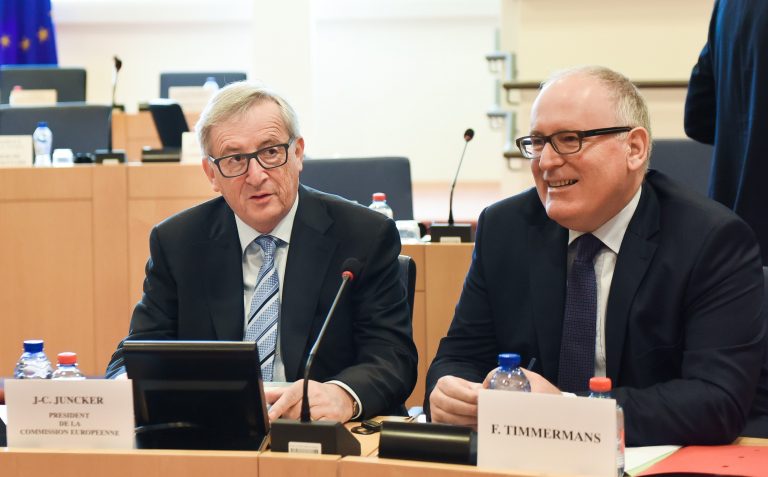Soeben hat die EU-Kommission ihre Bilanz und Empfehlungen für die nächsten 5 Jahre vorgelegt. Dazu sagt der Sprecher von Bündnis 90/Die Grünen im Europäischen Parlament, Sven Giegold:
“Die Empfehlungen der EU-Kommission sind so unkonkret, dass man sie folgenlos vor und nach jeder Wahl sagen kann. Zum Schutz des Klimas vor der drohenden Heißzeit ist die EU-Kommission gefährlich ambitionslos während unsere junge Generation auf der Straße endlich konkretes Handeln fordert. Die Kommission des christdemokratischen Präsidenten Juncker und seines sozialdemokratischen Vize Timmermans ist erschöpft. Ihnen fehlt sogar die Kraft zum klaren Bekenntnis das Klimaabkommen von Paris umzusetzen. Europa muss bis 2030 60 Prozent weniger CO2 ausstoßen als 1990. Statt den orientierungslosen Status Quo-Parteien braucht Europa pro-europäische Veränderung in Richtung Klimaschutz, soziale Gerechtigkeit, Demokratie und europäische Handlungsfähigkeit.”
———————-
HINTERGRUND: Empfehlungen der EU-Kommission für die nächste strategische Agenda: http://europa.eu/rapid/press-release_IP-19-2309_en.htm
“Future action should, in the Commission’s view, focus on 5 dimensions:
1. Protective Europe: We should pursue our efforts to build an effective and genuine European Security Union and move towards a genuine European Defence Union to make defence cooperation within the EU the norm rather than the exception. We also need to be more proactive in managing migration. This requires comprehensive action at every level and a genuine EU approach built on the sharing of responsibility and on solidarity between Member States.
2. Competitive Europe: We need to upgrade, modernise and fully implement the single market in all its aspects. We need to focus research and innovation on the ecological, social and economic transitions and related societal challenges. We need to invest in key European digital capacities and work together to boost Europe-made and human-centric artificial intelligence. We need to continue to foster growth and ensure sustainable prosperity by deepening the Economic and Monetary Union. And we need to continue to support the transformation of the European labour market whilst ensuring its fairness.
3. Fair Europe: We must continue to deliver on the European Pillar of Social Rights. We also need to work with Member States to achieve social inclusion and equality, including by addressing regional disparities, minorities‘ needs, gender issues and the challenge of an ageing population. We need to firmly uphold and promote the shared values on which the European Union is founded, such as the rule of law. We need a fair and modern taxation policy as well as high-quality, affordable and accessible health care and access to quality, energy-efficient affordable housing for all in Europe.
4. Sustainable Europe: We need to modernise our economy to embrace sustainable consumption and production patterns. We need to reinforce our efforts to fight climate change and reverse environmental degradation. We must transition towards a more resource-efficient circular economy by promoting green growth, bioeconomy and sustainable innovations. And we need to maximise the Energy Union’s potential by addressing major remaining challenges including energy security, energy costs for households and businesses, and the impact on climate change.
5. Influential Europe: Europe needs to lead in the world through consistent and strong support for a multilateral, rules-based global order, with the United Nations at its core. The EU should also make it a priority to develop strong relations with close neighbours, based on a clear balance of rights and obligations. A strengthened international role of the euro would also increase Europe’s economic and monetary sovereignty.”
Hinweis: Dieser Blogbeitrag wurde innerhalb der letzten 6 Wochen vor der Europawahl 2019 veröffentlicht. In diesem Zeitraum wurde die Homepage und die zugrunde liegende IT-Infrastruktur aus Wahlkampfmitteln und nicht aus dem Parlamentsbudget finanziert.

